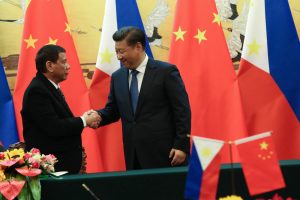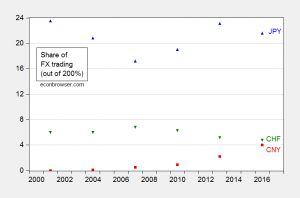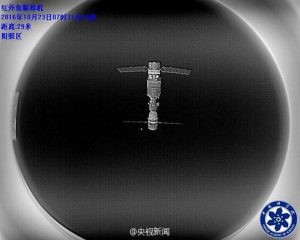Tiangong II’s ‘Selfie Satellite’
Here’s a great new view of China’s Tiangong II space station, taken by a new ‘selfie’ satellite. The Banxing-2 satellite is about the size of a desktop printer and was released from the station on Sunday. It has been nicknamed the “Selfie Stick” by Chinese officials and is taking pictures of the station and the docked Shenzhou XI spacecraft. The Chinese astronauts who boarded the station last week aren’t just joining the selfie craze; the 25 megapixel camera with wide-angle and infrared imagers has a specific job. “The companion satellite monitors the conditions of Tiangong II and Shenzhou XI all the time, which is helpful in detecting failures,” said Chen Hongyu, chief engineer of the micro-satellite.
– Universe Today
Duterte’s Pivot to China and Sino-US Rivalry

President Rodrigo Roa Duterte and People’s Republic of China President Xi Jinping shake hands to conclude a successful bilateral meeting at the Great Hall of the People in Beijing on October 20. Photo by Toto Lozano/PPD
Philippines President Rodrigo Duterte’s reversal of the confrontational ways of his predecessor toward China has prompted much soul-searching and second-guessing in Washington’s halls of power and at the headquarters of major Western, especially American, media organizations. Indeed, Time magazine deemed Duterte’s statement about a “separation” from the US “stunning”, adding that under the backdrop of acrimonious relations between the two countries over the recent past, the setting was “momentus”. A contributor to Foreign Policy magazine stated outright that it is a “disaster” for US foreign policy.
Underpinning the US’s ‘pivot’ to Asia inaugurated by President Obama and then Secretary of State Clinton, apart from shifting 60% of its military might to Asia-Pacific, is America’s relations with longstanding allies like Japan, South Korea, Australia and Singapore. One of the pillars of that strategy is relatively unfettered access to Philippines bases from which it could seek to hem China within the so-called ‘first-island chain’ linking the Japanese archipelago, Okinawa, the Philippines and Taiwan.
Yet, Philippines foreign policy insiders say openly the Obama Administration has failed to “put meat into its declaration”, leading Duterte to suspend joint military patrols with the US in the South China Sea soon after he assumed office. This week, in a subsequent state visit to Japan after China, Mr Duterte reiterated he wanted foreign military troops (meaning US) out of his country “probably in the next two years.” Pointing to U.S. colonization for over half a century, Duterte said the Philippines will “survive” without U.S. assistance.
Over the summer, President Duterte did not take kindly to high profile criticism from President Obama, the UN, and the EU of his heavy-handed but effective war against the drug lords with the US upping the ante by refusing to sell him arms. In a CCTV interview before his departure to Beijing, Duterte complained, “some other countries know that we are short of money, (but) instead of helping us, all they had done was just to criticize. China never criticizes. They help us quietly. And I said that’s why it’s part of the sincerity of the people”.
In the Chinese capital, Duterte was handsomely rewarded for his win-win statements and reinvigorated spirit of dialogue and cooperation. In trade and investment, the Chinese side agreed to spend US$15 billion on projects to help realize what promises to be the biggest infrastructure boom in the Philippines since the bad old days of dictator Ferdinand Marcos. Much of those facilities will be built by Chinese companies, including railway lines and dredging to enlarge the Cebu International Bulk Terminal Port. Philippines will also partake in China’s One Belt, One Road initiative that involves multi-faceted connectivity along the age-old maritime Silk Road.
In the fallout of Duterte’s ‘pivot, policy makers and analysts on both sides of the Pacific inclined to seeing great power relations in zero-sum game terms are wondering whether it will trigger a ‘bandwagoning’ domino effect on smaller powers toward China or increasing their propensity to ‘balance’ or ‘hedge’ against the rising Asian superpower. The Chinese and Philippines defense ministers’ agreement to restore ties between the two navies undoubtedly called all countries with territorial disputes with China in the South China Sea to attention. Aside from Japan, which has all of its eggs in the American basket, the focus is on third-tier countries like Vietnam that, prior to Duterte’s pivot, was bonding with would-be ally the Philippines and making friendly gestures to its former arch-enemy.
However, in light of Duterte’s harsh anti-Washington rhetoric, Vietnam was already back-peddling from any fabled alliance with would-be partners. Over the summer in Beijing, its defense and foreign ministers sang the praises of time-tested Vietnam-China relations. Then, in October, just prior to Duterte’s China visit, the country hosted the first-ever batch of three Chinese frigates at its newly-opened Cam Ranh international port which during the Vietnam War had served as a strategic deep water bay for the US navy.
This is all in line with Vietnam’s stated policy of non-alignment with any camp despite the warming of relations with the US over the past couple years. Since its opening, Cam Ranh has hosted ships from several countries including, France, Japan, Singapore, and the US. Ha Hoang Hop, a Vietnamese academic with close ties to the Vietnamese authorities told Reuters, “This is actually quite normal, showing that Vietnam is open to all countries and does not take any particular side…Vietnam’s diplomatic policy is not to engage with any military ally, or engage with any country, to oppose a third country.”
Thailand’s China embrace is also somewhat disconcerting to America. The military junta has been courting China since it took power in 2014. Although Thailand is bound by a US military alliance with the US, it has commissioned China to build three submarines and enhanced military relations with China just as Washington suspended military aid over civil liberties concerns about its rule. Thailand has deported suspected Uighur Jihadists cum illegal immigrants en route to third countries and denied entry for Hong Kong “Occupy Central” protest leaders.
Moreover, as the largest trading partner of every country in East and Southeast Asia, China simply holds much sway in Thailand, heavily investing in the country since the coup and flooding its resorts with Chinese tourists. The same can be said of other ASEAN members: successful talks with Myanmar’s new government, building railways and power plants in Laos; various aid and investment projects in Cambodia; enhanced trade with Malaysia; and building high speed rail in Indonesia.
While causing much consternation among American policy makers, and contrary to some US-based pundits who vilify him as an irrational and ideological loose cannon, Duterte is above all a nationalist pursuing an independent foreign policy and looking out for the fundamental interests of his country. At a news conference in his home town early last month, Duterte declared, “in our relations with the world, the Philippines will pursue an independent foreign policy. We will observe, and must insist, I repeat, I must insist, on the time-honoured principles of sovereign equality, non-interference, and the commitment to a peaceful settlement of disputes to best serve our people and protect the interests of our country.”
This is music to Beijing’s ears and history may be in China’s favour, argued political scientist Zhang Baohui of Hong Kong’s Lingnan University. “In the long term, the balance in the region may continue to shift in China’s favour. Duterte has stated explicitly that only China “has the resources” to help the Philippines to achieve genuine economic modernization…This implies that Duterte’s China pivot is motivated in part by China’s rising material capabilities…Therefore, it is plausible that a continuously ascending China may trigger additional bandwagoning behaviour by countries in the region.”
New Book on the Rise of the Renminbi
Eswar Prasad is a renowned economist at Cornell University mentioned before on this blog and an expert on the trajectory of the renminbi (RMB). His most recent book Gaining Currency: The Rise of the Renminbi provides a vivid account of its growing influence around the world but also the challenges and obstacles that lie ahead for the ‘redback’. Its rapid rise following the global financial crisis is shown in the charts below, albeit still at very low level.

Share of OTC forex turnover accounted for by the RMB (red), the Japanese yen (blue) and the Swiss franc (green).
Mr Prasard is cautiously optimistic about the prospects of the “people’s currency” and he’s probably right that it won’t take over from the dollar anytime soon. However, in the coming decade or two, it will certainly be a strong contender for the no.2 spot, most likely displacing the euro. He also underestimates the Chinese government’s commitment to political, legal and institutional reforms and is wrong that the currency will not attain “safe haven” status for investors. If not Western investors, certainly Asian and developing world investors will want to buy RMB to hedge against crises.
The book’s website writes: Gaining Currency traces the RMB’s ascendancy from revolutionary symbol to reserve currency held by foreign central banks. Prasad reveals the interconnections linking China’s growing economic might, its expanding international influence, and the rise of its currency. If China plays its cards right by adopting reforms that put its economy and financial markets on the right track, the RMB could rival even the euro and the Japanese yen.
Prasad shows, however, that while China has successfully adopted a unique playbook for promoting the RMB, many pitfalls lie ahead for its economy and currency that could limit the RMB’s ascendance. The Chinese leadership is pursuing financial liberalization and limited market-oriented reforms…While the RMB is likely to become a significant reserve currency, it will not attain “safe haven” status as a currency to which investors turn during crises.
Growing European Backlash Against Chinese Investment
In early September, a piece was posted on this blog on the need for reciprocity in investment between China and Canada. Recently, following Chinese appliance giant Midea Group’s takeover of German robot maker Kuka AG, the German government is looking closely at increased oversight of foreign cum Chinese investment in the entire EU.
In the backdrop of growing protectionist sentiment around the world, especially in economically developed nations, China will surely face increasing scrutiny of its investments in key sectors of the economy, particularly those involving advanced manufacturing, technology and information systems.
While recent policy pronouncements by the Chinese government on opening up more sectors to foreign investors is an encouraging sign, China must do more to entice foreign investment, removing impediments in non-strategic sectors of the economy. More must be done to whittle down the ‘negative lists’ in China’s free trade zones and spread that experience to the broader economy. It is in China’s interest to do so given its need to feed a rapidly growing consumer market and to reduce/prevent protectionist backlash overseas.
Germany is seeking tighter control over foreign investment in European companies, in a sign of a growing protectionist reaction to China’s appetite for overseas acquisitions.
Spurred by the purchase of German robot maker Kuka AG by China’s Midea Group Co., Chancellor Angela Merkel’s deputy, Sigmar Gabriel, is calling for European Union measures to give national governments expanded powers to block or impose conditions on shareholdings of non-EU companies. He’s found an ally in EU Digital Economy Commissioner Guenther Oettinger, a German who’s a member of Merkel’s party.
“It’s absolutely right to initiate this debate at the European level,” Oettinger said in an interview last week. “Everybody has to play by the same rules. Clearly, there are many countries, including big ones such as China, that make market access or corporate takeovers difficult or effectively impossible.”
While Merkel hasn’t publicly backed her vice chancellor’s push, Gabriel’s proposal reflects growing resistance within her government to unfettered Chinese investment in Europe’s biggest economy. In the latest potential Chinese bid, lighting maker Sanan Optoelectronics Co. Ltd. said it had held talks with Osram Licht AG on a possible acquisition of the almost century-old German company.
The initiative by Gabriel, who also is Germany’s economy minister, calls for allowing EU member states to step in if a non-EU investor seeks to acquire more than 25 percent of the voting rights in a company, according to a government document obtained by Bloomberg. Restrictions would potentially kick in if the home country restricts foreign investment or its government orders or funds the acquisition.
– Bloomberg on Yahoo Finance
http://finance.yahoo.com/news/german-momentum-grows-curbs-chinese-220001780.html;_ylt=AwrXgCOpew1Y.kMAepDQtDMD;_ylu=X3oDMTBzdmVvZmlwBGNvbG8DZ3ExBHBvcwMxMAR2dGlkAwRzZWMDc3I-
Organ Transplants in China
Notwithstanding the preposterous accusations made by Falungong groups in Canada and elsewhere that the Chinese government systematically harvests the organs of the cult’s followers, accusations that have even been disparaged by ardent anti-China hacks like deceased ‘laogai’ critic Harry Wu, the recent case of a Canadian patient receiving an organ in China after only a short three-day wait sheds light on the need for continued reforms to the current organ transplantation system in the country.
The case raised alarm bells at the Montreal-based Transplantation Society, a NGO that serves as an international forum for the worldwide advancement of organ transplantation. The issues at hand are whether China is meeting its pledge to ban the harvesting of organs from executed inmates made in January 2015 and to what extent does corruption in the system come into play regarding so-called ‘black-market surgeries’ that still occur. In any event, their numbers and the way organs are procured are a far cry from that alleged by international anti-China groups.
Speaking at the plenary session of the 26th international Congress of the Transplantation Society held in Hong Kong last August, Huang Jiefu, director of China’s Organ Donation and Transplantation Committee and a former vice-minister of Health, disclosed that doctors performed 10,057 organ transplants in China last year, about 8.38% of the world total. According to official records, 2,766 organs were donated in 2015, more the total in the two previous years combined. In the first seven months of 2016, 2,152 cases were recorded, up over 49% over the same period last year, with the final tally expected to meet or exceed a total of 4,000 by the end of the year.
The demand for useful organs is massive in China with round 300,000 patients a year waiting for them. The country performs the world’s highest number of organ transplants after only the US. The government readily admits a major shortfall in the number of hospitals and doctors capable of performing transplants. China’s need remains dire in spite of the fact that Chinese donation rates leads Japan and most other Asian countries and donations are the third highest globally albeit far behind the US and most Western nations. In part, this stems from conservative Confucianist ethical beliefs about maintaining the integrity of the body after death along with ingrained cultural biases against organ donation.
In the Canadian case, which happened just prior to the Hong Kong convention, the Tranplantation Society immediately notified director Huang calling for a thorough investigation. In a sign considered positive by the Society, Mr Huang’s officials revoked the licenses of the physician and the hospital involved as they launched a criminal investigation into the allegedly illegal transplant. “Because China is a big country with 1.3 billion people and regional development is uneven, occasional legal violations are unavoidable”, director Huang admitted to reporters at the conference.
Since 2007, China has cracked down on 32 illegal intermediaries, arrested 158 suspects, investigated 17 medical institutions revoking the licenses of 44 medical staff and significantly, shut down 13 ‘black-market dens’, Mr Huang reported to the Society congress. In spite of such successful criminal prosecutions, however, Mr Huang stressed there is a continuing need to forcefully crack down on organ trafficking while legislating more regulations to deal with how organs are procured. A donor registry was piloted in 2010 and has been expanded into a nationwide system. The government has also been encouraging donations with major newspapers publishing positive stories of families donating their loved ones’ organs.
Dr Michael Millis, a transplant specialist at the University of Chicago who has visited several dozen transplant centers in China said before, doctors at those centers used to routinely schedule surgeries but nowadays, they could have multiple surgeries in a single day and then go for a stretch without any. To Dr Millis, that indicates they are operating on the up and down schedule of a system supplied through voluntary donations rather than depending on regular executions of death row inmates. As for allegations of an extensive network of ‘black market dens’, Dr Millis responded, “there is no evidence it is an extensive black market parallel system that would generate a large number of organs from executed prisoners.”
Other doctors stated the recorded usage of drugs given to transplant patients were in synch with China’s reported number of transplants. Dr Francis Delmonico, a professor at the Harvard Medical School and a renowned transplant surgeon remarked, “it is not a matter for us to prove to you that it’s zero…it’s a matter for the government to fulfill what is the law, just as it is in other countries of the world that we go to.” Dr Jose Nunez, an organ transplant advisor to the World Health Organization (WHO) held high praise for China’s progress. “You are taking the country to a leading position within the transplantation world”, he congratulated Chinese participants at the conference.

